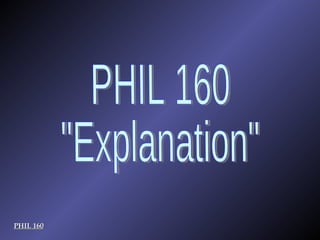Explanation classroomversion
•Als PPT, PDF herunterladen•
0 gefällt mir•800 views
The document discusses different types of scientific explanations and criteria for a good explanation. It presents the deductive-nomological model of explanation but notes some limitations, as not all good explanations fit this model and some arguments that fit the model may not be good explanations. Different examples are provided to illustrate explanations based on laws of nature, statistical generalizations, mechanisms, and pragmatic or contextual factors.
Melden
Teilen
Melden
Teilen

Empfohlen
Weitere ähnliche Inhalte
Andere mochten auch
Andere mochten auch (15)
Psychology, Science, and Pseudoscience: Class #03 (Nature of Science)

Psychology, Science, and Pseudoscience: Class #03 (Nature of Science)
The shaky foundations of science slides - James Fodor

The shaky foundations of science slides - James Fodor
Mehr von Janet Stemwedel
Mehr von Janet Stemwedel (20)
Lec16 International Strategies for Scientific Dialogue

Lec16 International Strategies for Scientific Dialogue
Explanation classroomversion
- 1. PHIL 160 PHIL 160 "Explanation"
- 2. PHIL 160 Goals of science: predictions manipulations explanations What is required for a good explanation?
- 3. Prediction vs. Explanation PHIL 160 What will happen next? Why did it happen? Prediction: Explanation:
- 4. PHIL 160 Why did it have to happen? How is it possible for this to happen? Why did this happen rather than something else? Why did it happen?
- 8. PHIL 160
- 9. PHIL 160
- 12. PHIL 160
- 13. “ Bridge Laws” PHIL 160 Volume = space through which point particles are moving Pressure = force from collisions with walls/area Temperature = measure of the kinetic energy of the particles.
- 14. PHIL 160
- 15. PHIL 160 Volume of the gas sample is decreased (less space for particles to move through). Why does the pressure of this gas sample increase?
- 16. Why does the pressure of this gas sample increase? PHIL 160 Same number of particles with same kinetic energy more frequent collisions with walls.
- 17. PHIL 160 More frequent collisions with walls higher force/area (i.e., higher pressure) Why does the pressure of this gas sample increase?
- 20. PHIL 160
- 24. PHIL 160 Smoking 2 packs of cigarettes a day for 10 years causes lung cancer. Not for every smoker! Not a law of nature. Why did Nancy get lung cancer?
- 25. PHIL 160
- 28. Cartwright : We don’t need a law! PHIL 160 We don’t need to know a law of nature to explain the camellias dying or thriving. There might be no such law of nature! (Explanation is still good.)
- 29. PHIL 160
- 32. PHIL 160 What kind of explanations in science? Looking for universal regularities or statistical regularities? Possible mechanisms or how it actually happened? (Causes, or something else?)
